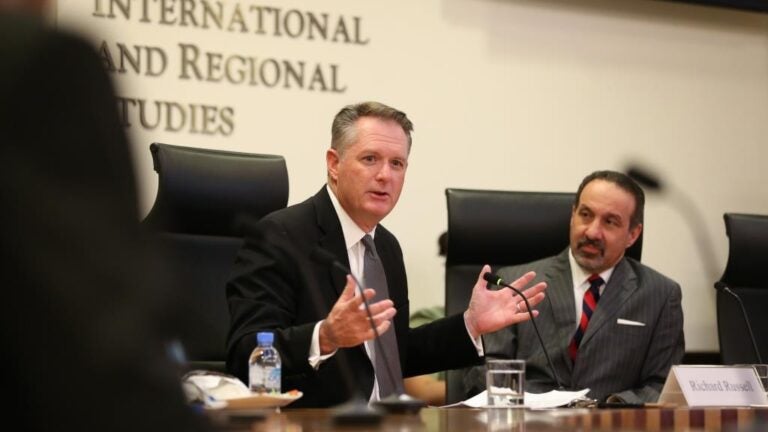American Studies, Distingushed Lectures, Regional Studies
Taking Measure of American Foreign Policy

CIRS invited Richard L. Russell, professor at the National Defense University in Washington, DC, to deliver a talk titled “Taking Measure of American Foreign Policy” on January 27, 2019, in which he shed light on the Trump administration’s foreign policy. He began by noting that halfway through Trump’s term in office is an appropriate juncture for an assessment of his administration’s foreign policy, but a definitive doctrine still cannot be identified. “It’s really hard for me to discern a ‘Trump doctrine.’ I mean, beyond ‘Make American Great Again’ or ‘America First,’” Russell said. “Maybe that captures the tone of the administration’s foreign policy, but it doesn’t, in my view, capture a substance.”
Russell used two international relations theories—realism and liberalism—to analyze the direction of Trump’s foreign policy, but noted that it was hard to label Trump as either realist or liberal since the president does not fit into either school. Russell explained that Trump does not qualify as a liberal, because he pays no regard to global democracy. Typically, the United States promotes democracy abroad in order to minimize international risks, but Trump “doesn’t promote democracy, he doesn’t celebrate it, and he doesn’t honor it. In fact, personally, he favors authoritarian states,” like Turkey, Egypt, and Saudi Arabia. Furthermore, Russel explained, Trump has alienated leaders of Western democracies, including the French, German, and British authorities.
Further, Russell argued that Trump does not fit into the liberal model because of his “disdain for multinational institutions,” as was evidenced by his backing out of the Paris Agreement on climate change and his scorn for NATO. The president has had harsh words for the United Nations, the World Trade Organization, and the World Bank—international institutions that became the fabric of international relations after World War II, which foster economic, political, and social stability internationally, he said.
Trump “doesn’t promote democracy, he doesn’t celebrate it, and he doesn’t honor it. In fact, personally, he favors authoritarian states.”
Neither does Trump fit the realist model, Russell explained. While some might consider the president to be a realist, Trump has no appreciation for international balances of power. Traditionally, nation-states balance power to prevent the outbreak of international violence according to realist theory, but Trump is not working to accomplish this, Russell said. For example, while Trump is concerned about China’s trade policy, he does not balance militarily or politically against China. Similarly, the president has not counterbalanced Russia in Europe or the Middle East. Paradoxically, Russell said, while the Trump administration’s documents reflect a realist philosophy, they bear “no resemblance to what President Trump talks about.”
Russell explained that Trump thinks in terms of bilateral relationships and emphasizes the importance of nation-states at the expense of multi-actor alliances. “It is true that the nation-state is the pinnacle of power in international society, but all nation-states operate in a web of interconnected economic, political, and cultural exchanges,” and Trump is not disposed to even acknowledging this fact, Russell noted. For example, instead of communicating with Japan and South Korea, with which the US has formal alliances, Trump focuses on dialogue with North Korea. “That’s not the way to facilitate the formal treaty obligations that the United States has with the security partners in Asia,” Russell said.
Typically, a US president surrounds himself with people who share his philosophy or worldview, but Trump’s government is internally fractured, Russell noted. Even before his election, many traditional Republicans refused to support him. As a result, Trump has relied on congressional and military staff to fill posts in his administration, in the process blurring the lines between the military and civilian government. This, coupled with the fact that Trump has removed two national security advisors in two years, leaves him with an extremely fractured and inefficient team, Russell said. The interagency process—the multilayered decision-making process used by the executive branch in all recent administrations—is also breaking down, Russell said. Important decisions, like withdrawing from Syria, are made by Trump without consultation or critical expertise, and by neglecting the diplomatic corps. Currently, there is no Assistant Secretary of State for the Middle East, for the Pacific, or for Europe, and many diplomatic posts are currently vacant.
In conclusion, Russell argued that Trump has managed to alienate the Intelligence Community during his time in office, and civil-military relations are at an all-time low. Since the president views the military as his political base, and has drafted military officers to fill national security positions, “Trump runs the risk of politicizing the military at the senior levels and in the rank-and-file,” Russell argued. Contrary to the president’s behavior, the US has always had “a military that’s apolitical—that is to say, it serves the US Constitution, not a president.” As a final word, Russell noted that the Trump administration is “breaking a lot of traditional norms that have held in both Republican and Democratic administrations in American foreign policy.”
Russell noted that the views he shared during this talk were his alone and not the views of the NESA Center or the US government.
Article by Khansa Maria, CURA Publications Fellow
Richard L. Russell is a Professor of National Security Affairs at the Near East and South Asia Center for Strategic Studies at the National Defense University in Washington, DC. He also is a Lecturer at the Bush School of Government and Public Service at Texas A&M University. He received a PhD in Foreign Affairs from the University of Virginia and previously had appointments as Adjunct Professor of Security Studies at Georgetown University’s Edmund Walsh School of Foreign Service and Research Associate at Georgetown’s Institute for the Study of Diplomacy. Russell has published three books on intelligence, American foreign policy, and weapons proliferation in the Middle East.